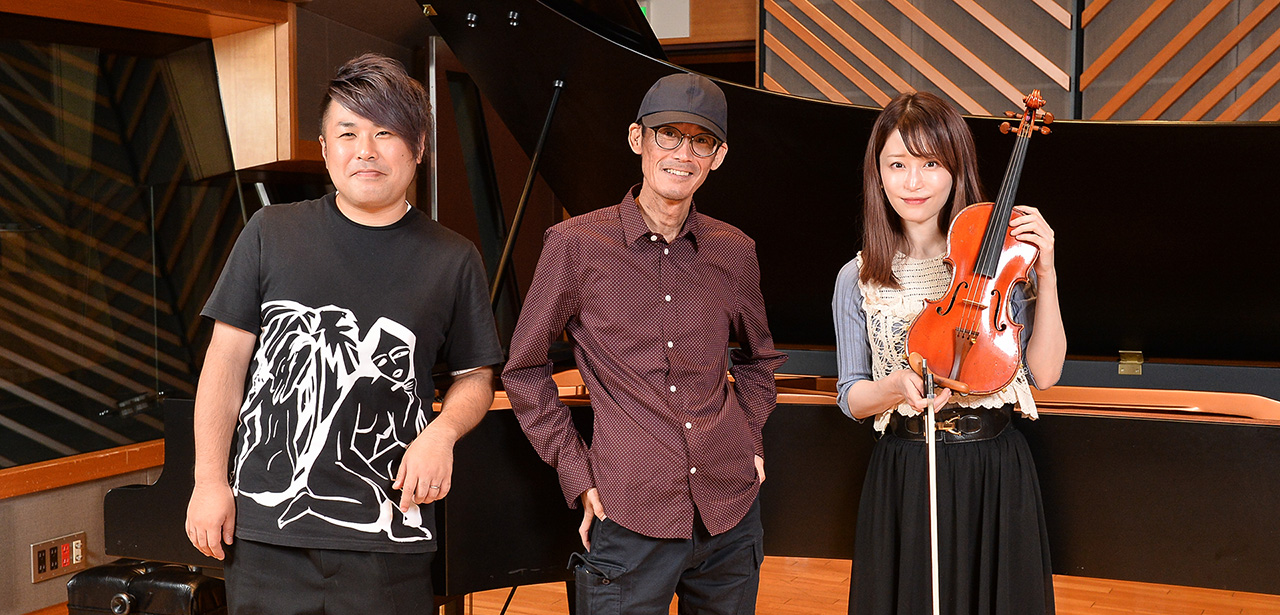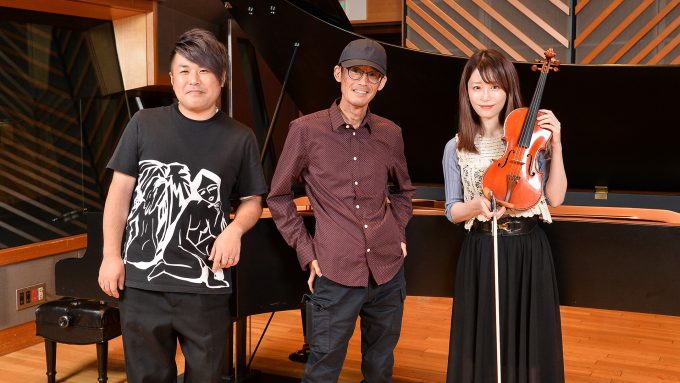We interviewed Nanaa Mihgo’s, the musical group led by FINAL FANTASY XI (FFXI) Composer Naoshi Mizuta, following one of their recording sessions. In this two-part interview, Mr. Mizuta shared how he came to be a musician and eventually joined the FFXI team, as well as details regarding the new song the Nanaa Mihgo’s are currently working on.

Composer for Square Enix who worked on the majority of the music for FFXI. His other works include FINAL FANTASY XIII-2, FINAL FANTASY XV Episode: Prompto, and Stranger of Paradise: Final Fantasy Origin.
Composer, arranger, pianist, and keyboardist. In addition to collaborating with various artists, he has also worked as an accompanist for anime, games, and commercials. His role in the Nanaa Mihgo's is that of a keyboardist and arranger.
Violinist. She has participated as a soloist and arranger in live performances and recordings of various artists. The “central figure” of Nanaa Mihgo’s during their recordings and live performances.
Choosing a musical career
I’ve never really had a chance to ask you about your background, would you mind if we started from there? (laughs) What made you pursue a musical career in the first place?
- Mizuta
I’ve always had a great love for music, and you could say that began from YMO*. When I was in third or fourth grade, my parents rented a YMO album from a record store for me. They were like, “Naoshi, you like this kind of music, don’t you?”
* Yellow Magic Orchestra is a musical group formed in 1978 by Haruomi Hosono, Yukihiro Takahashi, and Ryuichi Sakamoto. Your parents had quite the sophisticated tastes. (laughs) Is that the famous second album, “Solid State Survivor”?
- Mizuta
No, it was the first one, “Yellow Magic Orchestra,” the album with "Tong Poo" and "La femme chinoise.” Listening to that album blew my mind, even as a child. I guess I showed an interest in synthesizer sounds from an early age, which my parents noticed and introduced me to YMO.
That was my first experience of being blown away by music. Seems like you already established a taste in music by then. From there, you’d eventually decide to pursue a musical career, but what led up to that?
- Mizuta
I also enjoyed video games just as much as music, and my student life consisted of going straight to the arcade after school. I enjoyed music as its own thing and purchased a synthesizer to compose my own melodies, but I’d never considered making it a career.
But that eventually changed at some point, right?
- Mizuta
I really didn't have any plans in mind. (laughs)
* In Japan, annual terms often begin in April, such as the school year or fiscal year.
The high school I attended was a prep school, so I did have a vague idea that I’d be attending college. Then during my senior year in college, I was hit with a realization: “What am I going to do starting next April?”* Until then, I’d been mindlessly following the path that’d been laid out for me, and it wasn’t until my senior year that I realized I’d have to find my own way from there on out. (laughs wryly)

You really waited till the last moment to come to that realization. (laughs)
- Mizuta
As late as I was, I finally understood why everyone else was job searching, and began to panic.
- Okabe
But that’s pretty much how it goes for students at music universities too. (laughs)
- Mizuta
Prior to that, all I ever thought about was Street Fighter II*, like how to use anti-air moves and which attacks had an advantage over others. (laughs)
* Street Fighter II is a fighting game by Capcom released for arcades in 1991 which saw unprecedented popularity. - everyone
(laughs)
- Mizuta
I began looking for a job once I finally understood that “the path ended there,” but if I was going to work, I wanted to continue doing what I loved. My unquenchable love for games led me to look for game companies, but since I loved music just as much, I realized, “If I get a job making music at a game company, I can do both!”
- Iga
Two birds with one stone!
- Mizuta
From there, I flipped through job magazines and sent my demo tape to game companies with a sound department. I applied to three or four places, but Capcom was the first to offer me a job, so I was like “I’ll do it! I’ll do it!” and made my decision right away. I enjoyed Street Fighter II, after all. (laughs)
Back then, game companies developed their own audio sources, especially in arcade games, so each company had their own distinct style of sound. Was there a particular company you’d wanted to join based on their style?
- Mizuta
I certainly had my preferences, but I was desperate to join any company that would take me.
I see. So theoretically speaking, would you have gone to Namco (now Bandai Namco Entertainment) if they’d been the first to offer you a job?
- Mizuta
I’m sure I would have.
Anyhow, despite putting off employment plans until your senior year in college, you managed to start your career as a musician at a leading game company.
- Mizuta
I later heard that I was apparently job searching when Capcom was hiring many fresh graduates, so it seems it was an easy timing to get in.
You say that, but I don’t think just anyone could get in…
- Mizuta
That might’ve been the case, but getting into a game company nowadays requires far more than just passion, so I’d still consider myself lucky.
Seeking a change in atmosphere
After that, you moved from Capcom to Square (now Square Enix), but what led up to that?
- Mizuta
Things went smoothly over at Capcom, but… how should I put it? I felt that I didn’t quite fit into the “jock-like” atmosphere the company had at the time. Please don’t take it seriously, that was just how I felt at the time.
- Okabe
You’re like the polar opposite of a jock, Mr. Mizuta. (laughs)
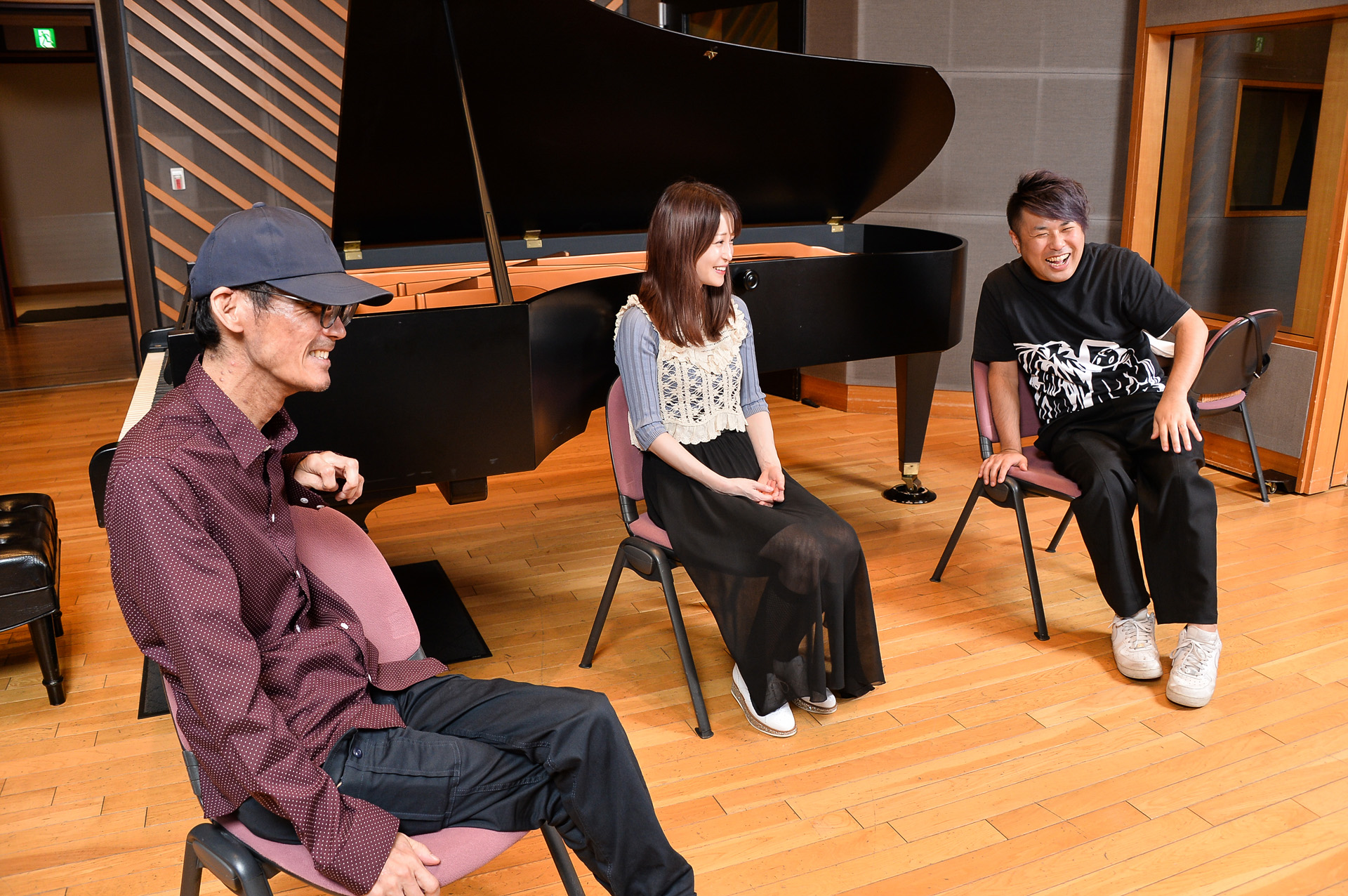
- Mizuta
I was still young and had this desire to work in a “cool” manner. I’m embarrassed to admit it, but it’s what you’d call “a youthful ignorance.”
And so you sought to work elsewhere.
- Mizuta
Looking back on it even now, Capcom was a very fascinating workplace with lots of fun people. They took in someone like me with no experience whatsoever, but once I was capable of doing some degree of work, I told them “I quit.” That was ridiculous of me. (laughs wryly) I wouldn’t quit over something like that now, but you could say I was still immature in many ways back then.
That was around when Square had the development team in Osaka, wasn’t it? Was moving to Square convenient for you in that respect as well?
- Mizuta
Yes, I was able to keep living at the same place when moving to Square. My first job was on Parasite Eve II*, and looking back, it might’ve just happened to be a time when the Osaka team needed someone who could start working immediately.
* Parasite Eve II is an adventure RPG released for the PlayStation in 1999, sequel to the game based on the novel by Hideaki Sena. Parasite Eve II was released in December of 1999, which wasn't all that long before you joined the FFXI team.
- Mizuta
That’s right. As you know, pretty much the entire Osaka team moved to Tokyo. I was told almost none of the development team would remain in Osaka, so when they asked if I wanted to move to our headquarters in Tokyo, I accepted.
Did you already know you’d be working on FFXI when you decided to go to Tokyo?
- Mizuta
I wasn’t aware. I was like, “Well, here I am in Tokyo, but what are they going to have me do…?” I had nothing to do for a while, until one day I was asked, “Would you join us in making a new title in the FF series?”
So you accepted, and the next thing you know, 20 years had passed.
- Mizuta
That’s pretty much how it went. (laughs)
A “conviction” in every song
Were Mr. Uematsu* and Ms. Tanioka* already working on FFXI when you joined the project?
* Nobuo Uematsu, composer of numerous tracks in the FF series.
* Kumi Tanioka, composer, arranger, and pianist.- Mizuta
The three of us started working on the project at the same time. There was already a list of songs that were requested, so we started off by deciding who’d work on each one. I don’t really remember how we split up the songs, but I think we just divided them with no particular criteria.
With the three of you working on the same title, did you have any rules among yourselves?
- Mizuta
We didn’t make any rules in particular. But I do remember Mr. Uematsu telling me, “For the most part, let’s try to avoid using synthesizers or electronic sounds in FFXI.”
Wait a minute. Didn’t Mr. Uematsu compose “Airship,” which clearly uses an electronic synth lead in the main melody?
- Mizuta
That was my reaction too when I heard “Airship” for the first time. I was like, “Wait…” (laughs)
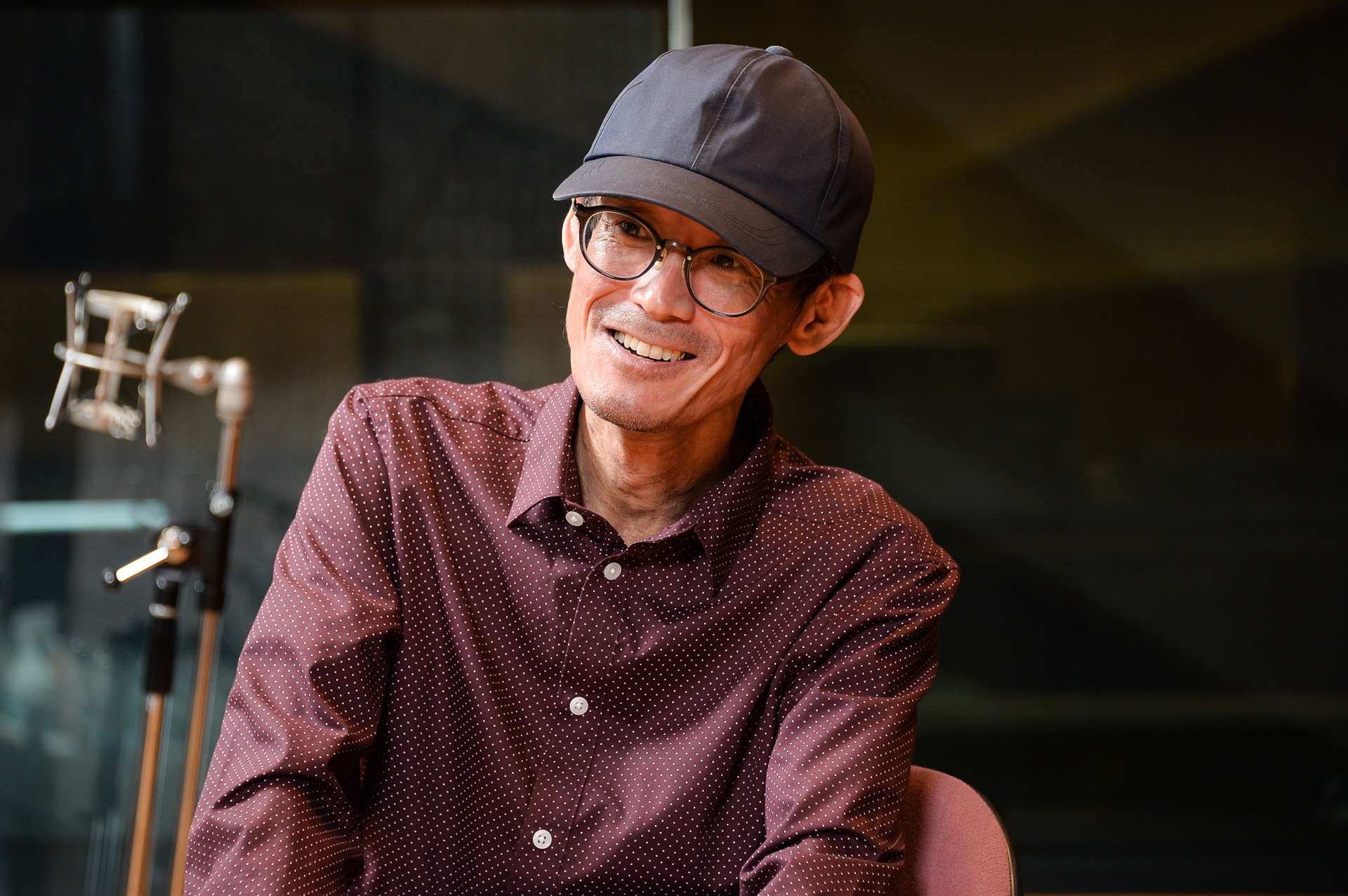
Did you ask him about it?
- Mizuta
No, commenting on each other’s songs wasn’t really something we did, so I just assumed he had an idea in mind.
Airships are a special part of the FF series, so perhaps distinguishing them like that felt right to Mr. Uematsu.
- Mizuta
I think so too.
With 20 years having passed since FFXI launched, how do you feel about the fact that even now, players are listening to songs you wrote two decades ago?
- Mizuta
Knowing that the songs I wrote 20 years ago are still being listened to today makes me think, “Boy, am I glad I worked on it until I was satisfied.” There was never a song where I compromised and said, “Eh, this is good enough,” nor did I ever release a song when I still found it lacking.
So you gave it your all with every song.
- Mizuta
I believe the fact that we didn’t cut corners is what’s allowed them to last for so many years. If we’d done poorly, it would’ve been 20 years of, “I should’ve done so-and-so with that song instead,” and it makes me shudder to think about it.
- Iga
That'd be really stressful.
- Okabe
It’d make you want to go, “Oh no, don’t listen to that one!”
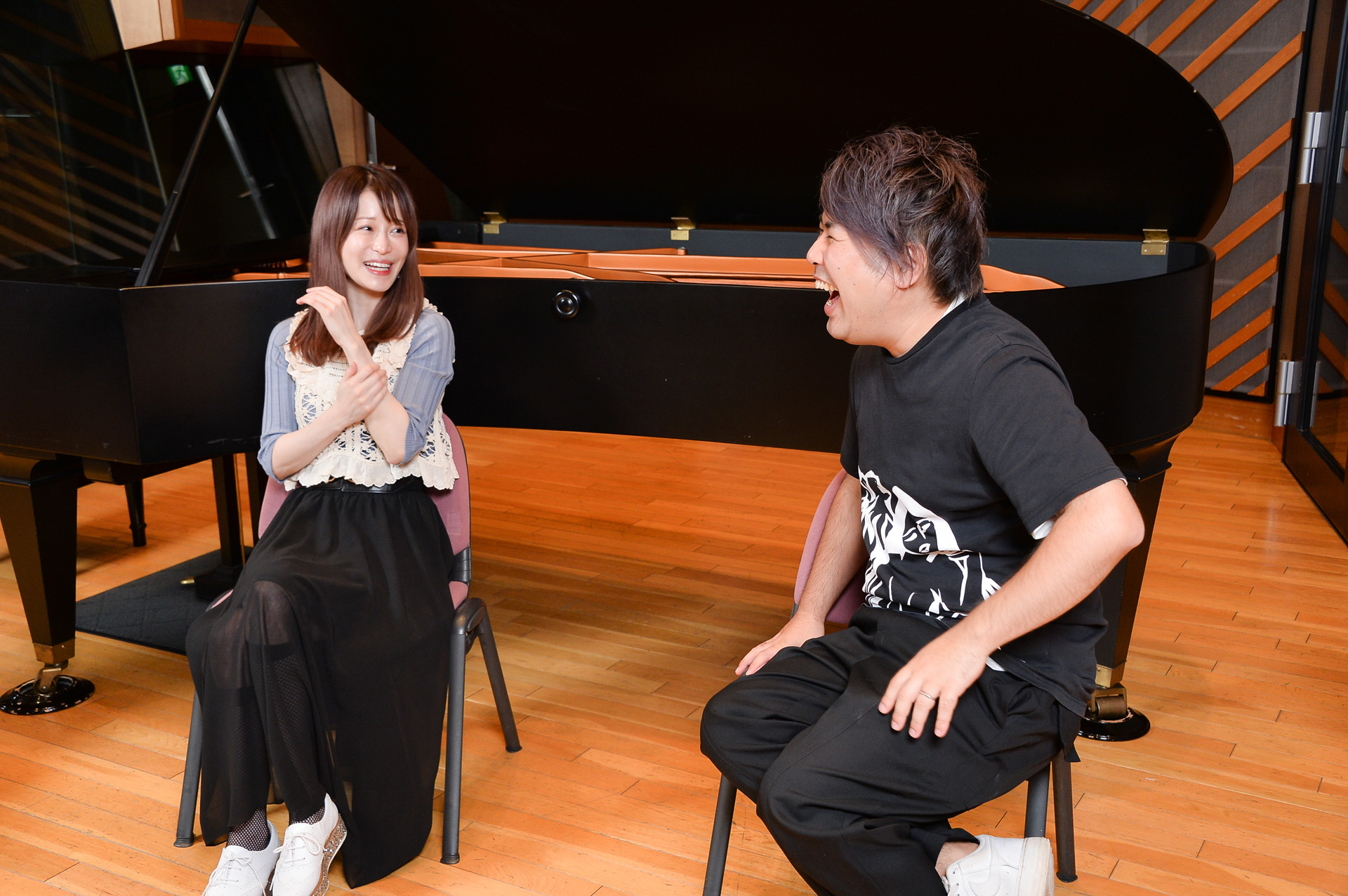
That goes for things other than music too; it’d be miserable looking back at your work from 20 years ago if you weren’t satisfied with it even at the time.
- Mizuta
Music production technology has evolved, and I’ve honed my musical skills since then, so there’s obviously parts where I go, “I’d change the melody this way if I were to work on it now,” or “I’d mix it like this instead.” But rather than the technical aspects like that, it’s about being satisfied with the fundamental concepts of the music.
- Iga
The melody is the best example of that. Because you’re satisfied with what you’ve done with the melody, you can express it in new ways, like you do with the Nanaa Mihgo’s.
- Mizuta
That’s true. I rarely change the sequence of notes in a melody.
Has your taste in music changed over the past 20 years?
- Mizuta
It’s changed a lot. But in our case, our work isn’t fully reflective of our tastes in music, so it can be hard to tell just by listening to the composition. In our line of work, what’s important is the kind of music the game needs and the kind of song the client is looking for.
So you’re saying that even if you’re devoted to a certain genre of music, it wouldn’t show up in your work if it doesn’t match what was requested.
- Mizuta
Well, there are times when I sneak them in as an essence, even when I think nobody will notice. (laughs)
* Part 2 will be available on August 31, 2022.



